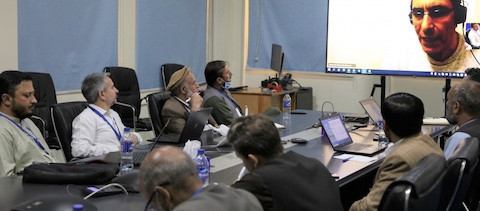
GCED Basic Search Form
Quick Search
You are here
News

Afghanistan is built on a rich heritage of oral and written traditions and possesses a wealth of literature in Dari and Pashtu. Unfortunately, due to four decades of devastating wars in the backdrop of a volatile political and socio-economic context, its rich literary tradition may remain unknown to the broader public. Literacy rates in Afghanistan are among the lowest in the world at about 45 percent for men and 17 percent for women.
In order to tackle the issue of illiteracy in the country and ensure that youth and adults acquire basic literacy skills, the MoE, with the support of UNESCO, developed a Basic General Literacy (BGL) curriculum for youth and adults in 2004. This curriculum was implemented for more than a decade to 1.2 million learners throughout the country and revised multiple times throughout its implementation stages. In the simplest terms, ‘curriculum’ is a description of what, why, how and how well students should learn in a systematic and intentional way. According to UNESCO’s International Bureau of Education (IBE), the curriculum is not an end in itself but rather a means to fostering quality learning. Over the last decade, there has been an increased focus within the Ministry of Education (MoE) to increase the relevance and quality of learning opportunities for youth and adults in Afghanistan.
In 2014, based on a needs assessment of the curriculum’s effectiveness, the Curriculum Framework for Youth and Adult Literacy and Basic Education (YALBE) was developed to provide a guiding framework for developing a YALBE curriculum (textbooks, teacher guides and assessment tools) in three different levels equivalent to grades 1-9 of general education. The framework also paved the way for the development of a proper Teacher Guide to guide literacy facilitators through teaching methodologies, teaching approaches, teaching plans and learner’s assessment modalities. The development process of YALBE level 1 curriculum, which is equivalent to grades 1-3 of general education, was completed in 2017 and officially launched in 2018.
Through an extensive capacity development process of the MoE on Non-Formal Education (NFE) curriculum development, UNESCO has dedicated efforts since early 2019 to supporting the MoE in the development of YALBE curriculum level 2, equivalent to grades 4-6 of general education. The syllabi for the subject areas literacy, numeracy and life skills for YABLE level 2 have already been developed which is competency based, activity based and learner oriented. The new syllabi features ease the process of learning through different activities and styles of learning. It also focuses on those learning areas and competencies which allow learners to become productive members of society. Furthermore, the syllabi are learner centered, which means that the teacher is only facilitating the discussion and it is the learners themselves who get engaged thoroughly in the learning process.
The objective of YALBE curriculum goes beyond learning how to read and write, it will help the learners acquire skills that could support them in their daily lives and in the labour market. Ihsanullah Madani, curriculum developer at the MoE’s Literacy Department emphasizes that “learning how to read and write is not the only concern of the illiterate population in Afghanistan nowadays. Learners want to acquire skills and competencies that can open doors to new opportunities and new approaches to life.” He further added that the YALBE curriculum is “a fundamental tool to respond to all the needs—reading, writing and competencies required for a meaningful social and economic life— of illiterate youth and adults within the country. “
For the time being, UNESCO and MoE curriculum developers are developing instructional materials for the YALBE level 2 language textbooks. Upon completion of these textbooks, the instructional materials for numeracy and life skills books alongside the assessment tools and teacher guides will be developed and completed. The expected deadline for completion of the instructional materials is set to be the end of 2021 and its pilot phase will start in early 2022.
Throughout the years of working intensely on YALBE curriculum level 1 and 2, UNESCO stands by the fact that curriculum development is never a one-time task but rather a continual process in need of regular revision based on the contextual developments of a country, including socio-economic, political, cultural and societal changes. With this context, YALBE curriculum is developed for the purpose of preparing youth and adults to become productive and useful members of society.
The YALBE curriculum development process is supported through the BESAF (Better Education System for Afghanistan’s Future) project, funded by the Government of Sweden through SIDA. Through BESAF, UNESCO aims to support the MoE to develop, implement and monitor a robust education sector plan, revise curricula and learning resources for formal basic education, non-formal adult education, and higher education; and to increase access to general literacy and skill-based literacy programs.
URL:
